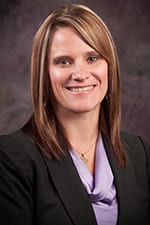
With students knee-deep in midterm exams and spring enrollment right around the corner, PFA Intern Sadie Polson took time to meet with Ashley Thomas, an academic advisor in her 6th year at K-State. Thomas is a 2003 graduate of K-State’s College of Agriculture and is working on a doctorate in Counseling and Student Development through the K-State College of Education.
PFA Intern: Ashley, I know this time of year is incredibly hectic for you as students begin preparing for spring enrollment, so thank you for taking the time to answer a few questions for our parents and families.
Ashley: No problem, Sadie! Thank you for asking me.
PFA Intern: Of course. Let’s get to it. Ashley, what are three words you would use to describe the academic advisor role?
Ashley: Academic advisors provide guidance. The term “advisor” is misleading sometimes, because we rarely give advice, but instead provide guidance to help our students make informed decisions. In my role, I should have knowledge of policies, procedures, and information at a high level, so that I can assist my students in making the best decisions for their goals and needs. Every student’s situation is different, so rarely do I give advice.
Secondly, support – we refer many students to other resources on campus or in the community. It’s my job to know what resources are available to my students to help with various situations, whether that’s personal, academic, career, etc.
Lastly, I t hink it’s very important for advisors to actively listen to their students – not to reply, but to understand. People in general like to listen to reply. Academic advising is sitting back and actively listening to our students so that we may understand how to accommodate to their individual needs and help them to be successful.
hink it’s very important for advisors to actively listen to their students – not to reply, but to understand. People in general like to listen to reply. Academic advising is sitting back and actively listening to our students so that we may understand how to accommodate to their individual needs and help them to be successful.
PFA Intern: While you work directly with students in the College of Business, what are the different advising models at K-State?
Ashley: K-State practices a variety of academic advising models across the college units. In the College of Business, we have eight full-time, professional advisors, so our primary job is academic advising. Other colleges have one professional advisor that works with the pre-professional students in navigating what the options within their major before transitioning to a faculty member in their respective areas. Other units may have faculty advising, where a professor also serves as an advisor, so it depends on the college or academic program students are majoring in.
PFA Intern: What does a typical day look like for you as an academic advisor?
Ashley: During the summer, we spend three weeks in June hosting orientation and enrollment and on-boarding new students. It is imperative for us as advisors to enroll students in a first semester that will set them up for success. We focus on sharing just-in-time information with new students, because we know that their orientation day is so overwhelming, but also want to ensure they are able to hit the ground running come August. July is quieter, so we are able to work on other projects in our roles, as well as continuously answering students’ emails and phone calls as they prepare for the fall semester.
When class is in session in the fall and spring, the beginning of the semesters are chaotic with students adding and dropping classes, accommodating for special circumstances, and adjusting schedules so that students clearly see their path to success. By mid-September, we begin the enrollment conversation for the spring, and our schedules quickly fill with students who are preparing for graduation or for continuing their time at K-State. Every day we have back-to-back 30-minute appointments so that we may connect with as many students as possible. Today I was able to squeeze in 3 students between appointments, because while we are preparing for enrollment, there are still students who may need to drop or add a class at this time and there are time-sensitive deadlines they need to meet.
After Thanksgiving Break (Spring Break in the spring), our schedules begin to slow down before we repeat the process again. This time of year we are constantly communicating with students about how they are doing in their current classes and what the future semesters look like as well.
PFA Intern: When did your passion for academic advising spark? How do you draw from personal experiences to support students?
Ashley: I am a prime example of not turning out to be what you thought you were going to be. I started as a student at K-State thinking I was going to be a veterinarian, something I had planned on since I was really little. I knew there was no other place I was going to go. I had a phenomenal advisor throughout most of my college career, but at that time, advising was really not on my radar. I still remember walking into her office one day when I was dressed up and getting ready to go to a mock interview. She noticed a string hanging off my jacket, and cut it off before I left. It was in that small gesture I realized not only did she help me navigate the courses and policies, but she just really cared. I think that influenced my advising today, because she made a significant impact on me.
Through career and life changes, I landed in the mental health field as a children’s adolescent case manager for 4 years. I first applied to a community college for an academic advisor position, because my counseling background lent itself really well to the counseling department of the community college. I was able to land that job and that’s what sparked my passion for academic advising.
I have a master’s degree in community counseling and that informs a lot of what I do. I am incredibly self-reflective. My goal is to always get to the foundation of a problem with my students. A student may come in with a problem that initially seems to be caused by a specific class, but using those counseling techniques, I am able to get to the root of the problem and where that stress is coming from. My ability to show compassion and to care for my students builds a trusting relationship where they feel comfortable sharing information with me that helps us solve that problem. And that’s why we always encourage students to visit us. Come in so that we can get to know you, but also so that we can have that professional relationship where we can have open and honest conversations that move us forward in difficult situations.

PFA Intern: What are common conversations you have with students?
Ashley: Most conversations we have start out surrounding graduation plans, course and curriculum choices, policies and procedures, etc. Within those conversations often come out certain personal issues students may be dealing with. We may start at the surface level discussing career goals, where we are able to refer students to the Career Center or Career Development offices. Advisors typically let the students guide conversations and we pick up on other topics that may need to be addressed as they talk.
PFA Intern: You connect with students this time of year to remind them to schedule appointments as we approach enrollment dates. What does this type of an appointment look like for students?
Ashley: One of the first questions I always ask my students is “how are things going?” and we begin talking through their individual classes. Almost 95% of the time, my students will say “Oh, it’s good!” and I’ll have to ask them to define “good.” Every student has a different definition of success, so it’s important for me to understand what “good” is for each individual. For a student that struggles, C’s are very successful, and that’s what I try to get at. I want to know what your definition of success is. Let’s define how you are doing right now and how do you feel you are doing.
At this point in the semester, a student may feel they need to drop a class they are currently taking. In this situation, we will talk about our options moving forward – maybe there is a summer class option or we fit the course into the next semester. We discuss how to approach that class in a different way next time to be successful. Whether it is scheduling a tutor earlier or putting resources and accommodations into place from the very beginning, we want to make sure our students are prepared for the more difficult courses.
PFA Intern: What is your advice to students who are approaching graduation?
Ashley: Take a deep breath, life has a way of working itself out. I understand that this is a very stressful time. For some students, college has been great so far and now we’re about to step foot in the real world and enter a job search. Then you have added pressure from families and support units saying “What are you going to do the rest of your life?” Use the resources you have at your disposal on campus. Use your network opportunities to reach out to people, even within your family. Many students don’t realize they have great connections through their parents and their jobs. Everyone at K-State is here to help you, so come see us.
PFA Intern: As I’m sure you know, students are not perfect. What are common mistakes or misconceptions students have about meeting with their academic advisor?
Ashley: A big misconception students have is that they are going to walk into our office and we are going to tell them exactly what to do. I try to avoid that. I am here to provide information to you so that you may make a decision that fits you best.
Especially to our new students, have a conversation with your advisor to learn how to prepare for your advising appointment. Each student has a degree audit, but that is sometimes hard to navigate the first time, so ask us for help. Learn how to read your degree audit. As advisors, we definitely care about your education, but it’s just that – it’s YOUR education. Learn to be your own advocate and speak up for yourself if you see something that doesn’t seem right. Don’t assume it’s correct. If you have questions, make sure you ask. Be your own advocate and take ownership of your education.
PFA Intern: How should a student prepare for their advising appointment?
Ashley: Look at your degree audit, and try to understand your curriculum. Be prepared with questions for your advisor. By using a long-range plan, students should have a good idea of courses to enroll in for the next semester.

PFA Intern: How do you define success when working with individual students?
Ashley: Celebrate success no matter what success looks like. I had a former supervisor that used to say “What do you call a doctor who got C’s going through med school? You call them a doctor.” Often times I see students comparing themselves to other students who have very different circumstances than they do, and I remind my students – You are your own individual. I want to celebrate your individual successes with you. In my household, we live by the saying that there is no growth in the comfort zone. I want my students to get out of their comfort zones and to grow personally, professionally, and academically, and at the end of the day, if you feel you are successful, that doesn’t have to be defined by a dollar amount or the house you buy after graduation.
PFA Intern: How can parents and families support their students this time of year in visiting with their advisor and looking ahead to the next semester?
Ashley: We love parents and families. Of course, we do have to operate within the guidelines of government policies that restrict us from sharing information, so that can be tricky sometimes. Unless we have the student’s permission, we cannot share any specific information. I can communicate with parents or families about general policies or procedures, but the student must be present in the conversation or have signed a waiver for me to share specific information related to that individual student.
However, I actually am emailing a parent today that does not have a waiver signed. Parents and families just want to help their students, and often times because they know the students better than we do. The parent I’m talking with today actually shared information with me that will be very helpful in guiding her student later today in his appointment with our discussions. We absolutely encourage parents and families to reach out to us with the understanding that we are restricted.
My advice to parents and families is to just be a support to your student. College can be such a tricky place to be sometimes. It can be incredibly overwhelming. We see so many students with anxiety and things because there are just so many things asking for their time. So be there, be a support for your student. Encourage their success. If you think other resources need to be brought in, talk with your student and feel free to reach out to us. Make sure you keep an open line of communication with your student and with us if needed.
PFA Intern: Ashley, thank you so much for sharing such great information with our parents and families. We’re all dying to know – what’s the best kept secret about academic advising?
Ashley: We are here to help. Every person at this university is here because we care about students. If I’m not emailing you every other day, it doesn’t mean I don’t care. But every single person here cares about the success and well-being of our students. I have a very deep passion for the development of people and helping people become their best selves. Every K-State administrator, faculty member, and staff member has the same underlying kind of passion. Knowing that, hopefully students are able to trust us.
PFA Intern: Do you have any additional comments you would like parents and families to know before we wrap up?
Ashley: Know that you are part of the Wildcat Family, too. Remember that even if you are not a K-State student or alumnus, you are still a part of our family.
PFA Intern: Exactly. Thank you so much for meeting with me today, Ashley! We greatly appreciate it.
Ashley: No problem! Thank you for having me!